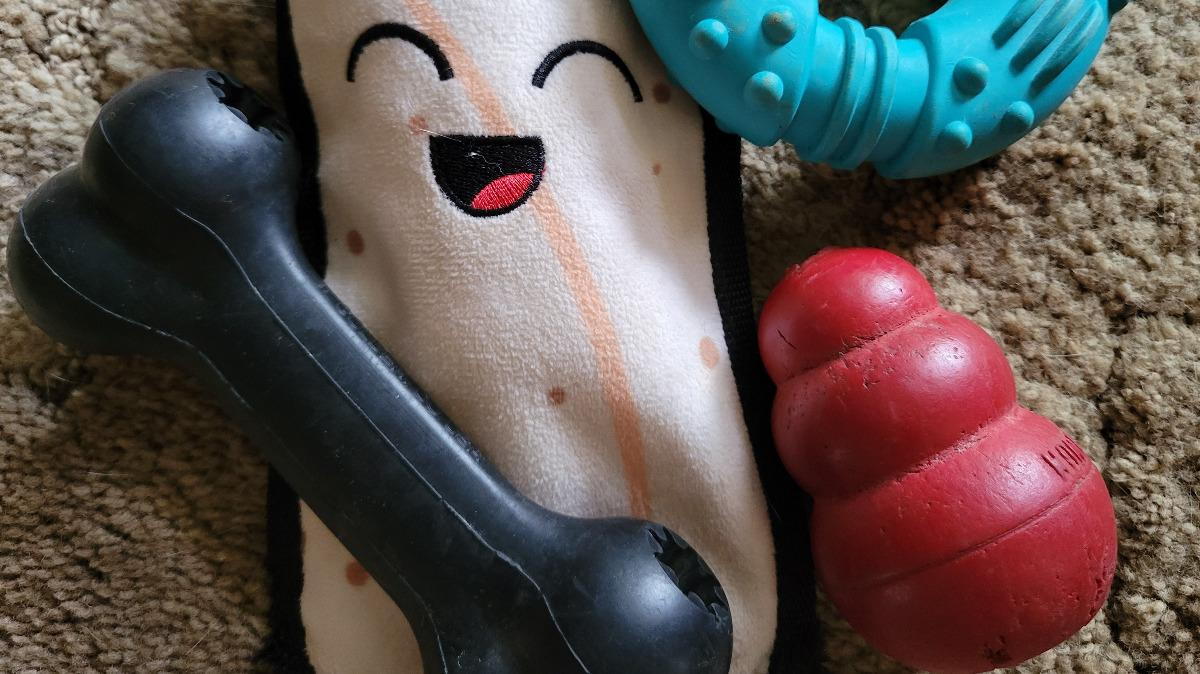Chew This, Not That: Safe Chew Toys for Dogs

- posted: Jun. 03, 2022
Chew This, Not That: Safe Chew Toys for Dogs
Chewing is a natural and healthy instinct for dogs. But some items are not safe for dogs to chew and can cause medical issues such as broken teeth or intestinal blockages. So, what can your canine chew on? Let’s learn more about types of chewing behavior and the best chew toys for your dog.
First, know your dog’s chewing personality as the type of toy offered depends on your dog’s behavior. Dogs tend to be either gentle, average or strong chewers. A gentle chewer will nibble or chew, but is not likely to destroy the toy, so plush toys are a good option. An average chewer (the category into which most dogs fall) may destroy plush or soft rubber toys, but can usually play with a wide variety of toys. Strong chewers are usually determined to chew up and destroy their toys so plush toys are not likely to stand up to these pups. More durable toys are needed.
Plush toys—stuffed or unstuffed—may be reasonable for gentle to average chewers but choose toys that do not have small bits that can be pulled off and squeakers may be best saved for gentle chewers as many dogs find and remove the squeakers and could swallow or choke on them. Use supervision with squeaky toys for this reason. Soft rubber toys may also be fine for gentle chewers but don’t hold up well to average or strong chewers. Rope toys and balls can be used with supervision but discard them if strings are unraveling from the rope or if a ball is damaged. With toy balls, choose a size large enough that your dog cannot swallow it.
Hard rubber toys such as Kong, Orbee Tuff and similar brands as well as some made with Kevlar or firehose tend to stand up well to average and strong chewers and are the preferred chew toy of most veterinarians for all dogs. However, dogs can still damage these toys over time so inspect and replace toys if your dog is pulling off pieces. Also, choose toys that are of an appropriate size for your dog so that he or she cannot swallow a toy whole.
Edible chews such as rawhide, bully sticks, Himalayan yak’s milk bones, and many dental treats are also fine with a few caveats. First, choose an appropriate size for your dog and always supervise dogs with products such as rawhide so they do not chew off or swallow large pieces. Second, choose products made in the U.S. whenever possible as some foreign products may contain preservatives such as formalin that are not safe for pets. Third, use caution if your pet has a food allergy or sensitive stomach as edible chews can sometimes harbor bacteria or may not be suitable for dogs with beef allergies or other food allergies.
Our vets do not recommend the following: Antlers, cow hooves, hard plastic bones such as Nylabones, or real bones of any kind (beef, chicken, pork). These types of chew toys are much too hard for dogs and can cause broken teeth, may become stuck in the mouth or may cause an obstruction or gastrointestinal irritation if bits break off and are swallowed. Bacteria can also be an issue with hooves and real bones.
To review, choose the right type of toy for your dog’s level of chewing, choose the right size toy, supervise your pet’s chewing and remove damaged toys and be sure not to use items that are too hard. Chewing is a normal and pleasurable thing for dogs, but keep them safe with these guidelines.
This blog brought to you by the Patton Veterinary Hospital serving Red Lion, York and the surrounding communities.
https://www.preventivevet.com/dogs/choosing-safe-dog-chew-toys
Location
Patton Veterinary Hospital
425 E Broadway
Red Lion, PA 17356
